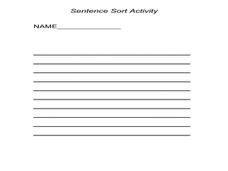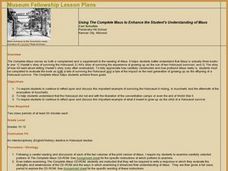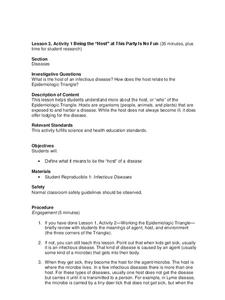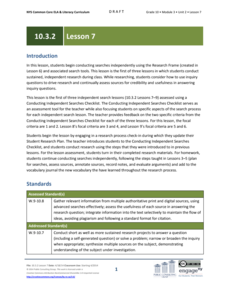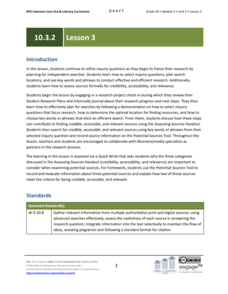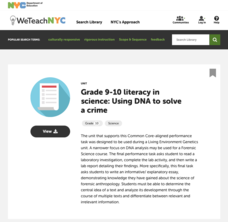Curated OER
Building a Complete Sentence with Sternberg
First graders use Sternberg templates to create complete sentences. In this complete sentence writing lesson, 1st graders discover that sentences begin with a capitol letter and end with punctuation, and form a complete...
Curated OER
Sentence Train
What child doesn't like trains? Use this fun idea to practice writing. Young readers learn to write complete sentences by using a train graphic organizer made out of construction paper. Each section of the train (engine, boxcar, and...
Civil War Trust
Civil War Newspaper
One photograph can represent so much more than the images on the film. Eighth graders select a photograph from the Civil War era and conduct additional research based on the subject matter from the picture. Once they complete the...
Curated OER
Complete the Writing Process/“Publish” Final Drafts/Evaluation
High schoolers complete the writing process. They present final drafts of essays that include thesis statements, appropriate paragraphing, elaboration, and style. They participate in a peer editing activity that requires them to use...
Curated OER
The Visual Thesaurus and the SAT
Demonstrate strategies for tackling unfamiliar vocabulary words in preparation for the SAT. Using Visual Thesaurus computer software, middle and high schoolers interpret contextual clues, solve sample sentence completion questions, and...
Los Angeles Unified School District
Capitalism and Socialism
Capitalism, socialism, communism ... these may seem like a whole bunch of isms to your scholars. High schoolers won't confuse them after completing an informative resource. Your class masters how to use primary sources to...
Curated OER
Using The Complete Maus to Enhance the Student's Understanding of Maus
Students read The Complete Maus to explore how Maus is actually three books in one. In groups, they evaluate the book as a tale of surviving the Holocaust and a tale of impacting future generations. They examine the conditions at...
Gallaudet School for the Deaf
The History of the American School for the Deaf
To better understand the significance and history of the American School for the Deaf, hearing-impaired learners conduct research, hold discussions, and write a play. The lesson spans three class periods and allows the class to explore...
Curated OER
Lesson Learned: Creating a Life Reports Project
Tap into the wisdom and knowledge of older members of the community with this New York Times plan. To warm up, learners write about and discuss advice they have been given. After reading "The Life Report," an op-ed column that asks older...
Core Knowledge Foundation
Unit 2: Early American Civilizations
Fifth graders explore early American civilizations in a four-week ELA unit. Every lesson offers an opportunity to read and discuss a selected passage followed by word work that covers vocabulary, grammar, and morphology. Learners write...
Insurance Zebra
Insurance Curriculum for Middle and High School Teachers
Liability, deductible, premium ... what do these words mean, and how do they relate to insurance? Scholars complete a pre-test, matching vocabulary activity, and insurance timeline worksheet and become familiar with these terms. Next,...
Maine Content Literacy Project
Introduction to The Lottery, by Shirley Jackson
"The Lottery" by Shirley Jackson is a great story to share with your class, and this instructional activity focuses on just that story! The eighth in a fourteen-instructional activity series on short stories, the plan has learners...
BioEd Online
Good Stress for Your Body
Stress the importance of the different types of pressure our mind and body experience in a lesson about how certain types of stress are actually necessary and good for our bodies. As astronauts and people with injuries can attest, not...
Curated OER
The True Confessions of Charlotte Doyle: KWHL
After completing the 11th chapter of The True Confessions of Charlotte Doyle by Avi, take part in a KWHL chart driven by the question,When is it appropriate and admirable to defy authority? Focusing on codes of conduct,...
Fluence Learning
Writing About Informational Text: Everybody Can Bike
A three-part assessment challenges scholars to read informational texts in order to complete three tasks. Following a brief reading, class members take part in grand conversations, complete charts, and work in small groups to research...
Curated OER
Environment: Clouds of Changing Times
Here is a wonderful lesson which has youngsters interview family and local elders about the seasonal history of their local area. They focus on climate change by asking questions about rainfall, temperatures, length of the seasons, and...
Nebraska Department of Education
Curriculum For Careers
Learners explore potential learning, earning, and living goals that align with their personal goals and interests in a comprehensive unit that includes complete lesson plans, interactive notebooks, worksheets, overheads, rubrics,...
Centers for Disease Control and Prevention
Being the “Host” at This Party is No Fun
Discuss the symptoms and variations from infectious diseases from one person to the next. After a class discussion, small groups complete research on the topic.
Columbus City Schools
What’s Up with Matter?
Take a "conservative" approach to planning your next unit on mass and matter! What better way to answer "But where did the gas go?" than with a lab designed to promote good report writing, research skills, and detailed observation....
EngageNY
Grade 10 ELA Module 3: Unit 1, Lesson 10
I know exactly how you feel. That may be a statement between Henrietta Lacks and John Moore. Scholars read John Moore's story and compare his story of cell use to that of Henrietta. Learners record in a vocabulary journal, analyze...
EngageNY
Grade 10 ELA Module 3: Unit 2, Lesson 7
Scholars begin to work independently on their research ideas from the first six lessons. They use their previous work in the first six lessons and a research checklist to guide their work. To finish, they complete graphic organizers,...
EngageNY
Grade 10 ELA Module 3: Unit 2, Lesson 3
Do you know if that source is reliable? Learners examine closely to determine which sources provide reliable information for their research. Scholars use organizers to examine each source based on credibility, accessibility, and...
New York City Department of Education
Grade 9-10 Literacy in Science: Using DNA to Solve a Crime
Scholars become detectives and use science to solve a crime! A complete unit introduces DNA and includes hands-on activities that have learners model DNA and extract it from different food types. A culminating activity challenges...
American Museum of Natural History
Trip Up Your Brain
Sometimes different parts of the brain disagree. See what this disagreement looks like using a remote learning resource to experience how brains often take shortcuts. Pupils complete the activity, observe their results, and then read...
Other popular searches
- Complete Sentences
- Complete Predicate
- Writing Complete Sentences
- Complete Subject Predicate
- Complete the Story
- Complete and Simple Subject
- Making Complete Sentences
- Complete Esl Lesson Plans
- Complete Predict
- Complete the Square
- Complete Sentences Fragments
- Complete Subjects
